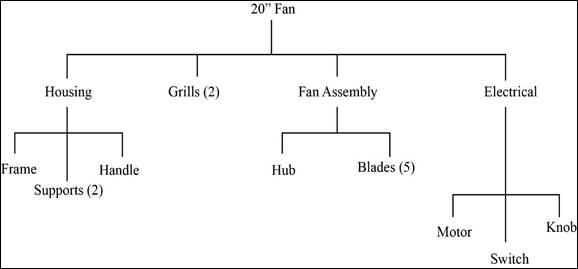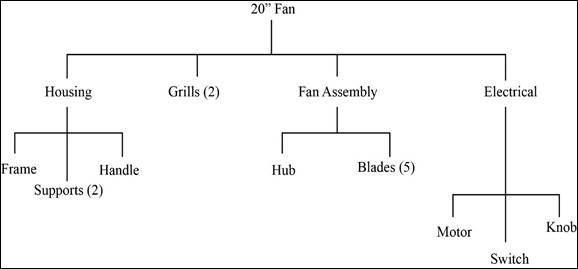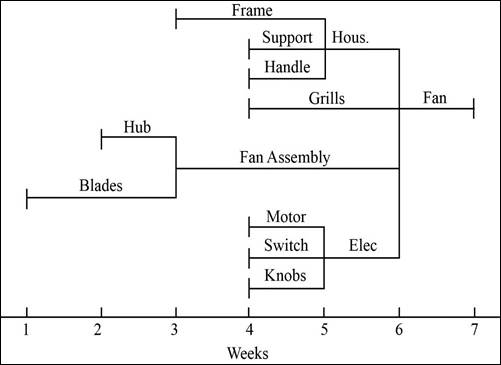
Concept explainers
a)
To construct: A product structure.
Introduction:
Product structure:
The product structure is a visual representation of the components needed for a product assembly and the sequence at which they must be developed. It will clearly depict the parents and children components at each level.
a)
Answer to Problem 13P
Product structure:

Explanation of Solution
Given information:
- 1000 20” fans due in week 7.
- Each fan is made of a housing assembly, two grills, fan assembly and an electrical unit.
- Housing assembly is made of frame, two supports, and a handle.
- Fan assembly is made up of a hub and five blades.
- Electrical unit consists of a motor, switch and a knob.
| Component | Lead time | On-hand inventory | Lot size |
|
| 20" Fan | 1 | 100 | ||
| Housing | 1 | 100 | ||
| Frame | 2 | |||
| Supports (2) | 1 | 50 | 100 | |
| Handle | 1 | 400 | 500 | |
| Grills (2) | 2 | 200 | 500 | |
| Fan assembly | 3 | 150 | ||
| Hub | 1 | |||
| Blades (5) | 2 | 100 | ||
| Electrical unit | 1 | |||
| Motor | 1 | |||
| Switch | 1 | 20 | 12 | |
| Knob | 1 | 25 | 200 in week 2 |
Product structure:

The product is a 20” fan. It is made of four components. Each fan is made of a housing assembly, two grills, fan assembly and an electrical unit. Housing assembly is made of frame, two supports, and a handle. Fan assembly is made up of a hub and five blades. Electrical unit consists of a motor, switch and a knob.
b)
To construct: A time-phased product structure.
Introduction:
Time-phased product structure:
The time-phased product structure will represent the product visually with the details of when each component must begin production. It should be done to ensure that all the components are on time.
b)
Answer to Problem 13P
Time-phased product structure:

Explanation of Solution
Given information:
- 1000 20” fans due in week 7.
- Each fan is made of a housing assembly, two grills, fan assembly and an electrical unit.
- Housing assembly is made of frame, two supports, and a handle.
- Fan assembly is made up of a hub and five blades.
- Electrical unit consists of a motor, switch and a knob.
| Component | Lead time | On-hand inventory | Lot size | Scheduled receipt |
| 20" Fan | 1 | 100 | ||
| Housing | 1 | 100 | ||
| Frame | 2 | |||
| Supports (2) | 1 | 50 | 100 | |
| Handle | 1 | 400 | 500 | |
| Grills (2) | 2 | 200 | 500 | |
| Fan assembly | 3 | 150 | ||
| Hub | 1 | |||
| Blades (5) | 2 | 100 | ||
| Electrical unit | 1 | |||
| Motor | 1 | |||
| Switch | 1 | 20 | 12 | |
| Knob | 1 | 25 | 200 in week 2 |
Time-phased product structure:

The end product is the fan which must be ready at week 7. All the other components must be completed on week 6. The components at the lower level must be completed first before proceeding to the higher levels. Each component at each level is begun depending on the lead time of the product.
The products are started in advance so that they are developed and ready on time so that the dependent parent will be ready to develop its product. The process is repeated until all the subassemblies are ready to make the final product.
c)
To develop: A net requirements plan.
Introduction:
Net requirements plan:
The net requirements plan is the plan which is established on the gross requirements plan formed by deducting the stock on and the scheduled receipts. If the total requirement is below the safety stock levels, a planned order is made based on the given lot sizing technique.
c)
Explanation of Solution
Given information:
- 1000 20” fans due in week 7.
- Each fan is made of a housing assembly, two grills, fan assembly and an electrical unit.
- Housing assembly is made of frame, two supports, and a handle.
- Fan assembly is made up of a hub and five blades.
- Electrical unit consists of a motor, switch and a knob.
| Component | Lead time | On-hand inventory | Lot size | Scheduled receipt |
| 20" Fan | 1 | 100 | ||
| Housing | 1 | 100 | ||
| Frame | 2 | |||
| Supports (2) | 1 | 50 | 100 | |
| Handle | 1 | 400 | 500 | |
| Grills (2) | 2 | 200 | 500 | |
| Fan assembly | 3 | 150 | ||
| Hub | 1 | |||
| Blades (5) | 2 | 100 | ||
| Electrical unit | 1 | |||
| Motor | 1 | |||
| Switch | 1 | 20 | 12 | |
| Knob | 1 | 25 | 200 in week 2 |
Net requirements plan:
20’’ Fan:
| Week | ||||||||||||
| 20" Fan | 1 | 2 | 3 | 4 | 5 | 6 | 7 | 8 | 9 | 10 | 11 | 12 |
| Gross requirements | 1,000 | |||||||||||
| Scheduled receipt | ||||||||||||
| On hand (100) | 100 | |||||||||||
| Net requirement | 900 | |||||||||||
| Planned order receipt | 900 | |||||||||||
| Planned order release | 900 | |||||||||||
Week 7:
The gross requirement is 1,000 (1 assembly). The on hand inventory is 100. Hence, the net requirement is 900. The lead time is 1 week. Therefore, the planned order release will be 900 in week 6 which will be the planned order receipt in week 7.
Housing:
| Week | ||||||||||||
| Housing | 1 | 2 | 3 | 4 | 5 | 6 | 7 | 8 | 9 | 10 | 11 | 12 |
| Gross requirements | 900 | |||||||||||
| Scheduled receipt | ||||||||||||
| On hand (100) | 100 | |||||||||||
| Net requirement | 800 | |||||||||||
| Planned order receipt | 800 | |||||||||||
| Planned order release | 800 | |||||||||||
Week 6:
The gross requirement is 900 (1 assembly) derived from the planned order release of 20” fan. The on hand inventory is 100. Hence, the net requirement is 800. The lead time is 1 week. Therefore, the planned order release will be 800 in week 5 which will be the planned order receipt in week 6.
Grills:
| Week | ||||||||||||
| Grills | 1 | 2 | 3 | 4 | 5 | 6 | 7 | 8 | 9 | 10 | 11 | 12 |
| Gross requirements | 1,800 | |||||||||||
| Scheduled receipt | ||||||||||||
| On hand (200) | 200 | 400 | ||||||||||
| Net requirement | 1,600 | |||||||||||
| Planned order receipt | 2,000 | |||||||||||
| Planned order release | 2,000 | |||||||||||
Week 6:
The gross requirement is 1,800 (2 assembly) derived from the planned order release of 20” fan. The on hand inventory is 200. Hence, the net requirement is 1,600. The lead time is 2 weeks. Therefore, the planned order release will be 2,000 (Lot Size = 500) in week 4 which will be the planned order receipt in week 6. The excess inventory will be available at week 7.
Fan assembly:
| Week | ||||||||||||
| Fan assembly | 1 | 2 | 3 | 4 | 5 | 6 | 7 | 8 | 9 | 10 | 11 | 12 |
| Gross requirements | 900 | |||||||||||
| Scheduled receipt | ||||||||||||
| On hand (150) | 150 | |||||||||||
| Net requirement | 750 | |||||||||||
| Planned order receipt | 750 | |||||||||||
| Planned order release | 750 | |||||||||||
Week 6:
The gross requirement is 900 (1 assembly) derived from the planned order release of 20” fan. The on hand inventory is 150. Hence, the net requirement is 750. The lead time is 2 weeks. Therefore, the planned order release will be 750 in week 4 which will be the planned order receipt in week 6.
Electrical unit:
| Electrical Unit | 1 | 2 | 3 | 4 | 5 | 6 | 7 | 8 | 9 | 10 | 11 | 12 |
| Gross requirements | 900 | |||||||||||
| Scheduled receipt | ||||||||||||
| On hand (0) | 0 | |||||||||||
| Net requirement | 900 | |||||||||||
| Planned order receipt | 900 | |||||||||||
| Planned order release | 900 |
Week 6:
The gross requirement is 900 (1 assembly) derived from the planned order release of 20” fan. The on hand inventory is 0. Hence, the net requirement is 900. The lead time is 1 week. Therefore, the planned order release will be 900 in week 5 which will be the planned order receipt in week 6.
Frame:
| Frame | 1 | 2 | 3 | 4 | 5 | 6 | 7 | 8 | 9 | 10 | 11 | 12 |
| Gross requirements | 800 | |||||||||||
| Scheduled receipt | ||||||||||||
| On hand (0) | 0 | |||||||||||
| Net requirement | 800 | |||||||||||
| Planned order receipt | 800 | |||||||||||
| Planned order release | 800 |
Week 5:
The gross requirement is 800 (1 assembly) derived from the planned order release of Housing. The on hand inventory is 0. Hence, the net requirement is 800. The lead time is 2 weeks. Therefore, the planned order release will be 800 in week 3 which will be the planned order receipt in week 5.
Supports:
| Week | ||||||||||||
| Supports | 1 | 2 | 3 | 4 | 5 | 6 | 7 | 8 | 9 | 10 | 11 | 12 |
| Gross requirements | 1,600 | |||||||||||
| Scheduled receipt | ||||||||||||
| On hand (50) | 50 | |||||||||||
| Net requirement | 1,550 | |||||||||||
| Planned order receipt | 1,600 | |||||||||||
| Planned order release | 1,600 | |||||||||||
Week 5:
The gross requirement is 1,600 (2 assembly) derived from the planned order release of Housing. The on hand inventory is 50. Hence, the net requirement is 1,550. The lead time is 1 week. Therefore, the planned order release will be 1,600 (Lot size = 100) in week 4 which will be the planned order receipt in week 5. The excess inventory is available at week 6.
Handle:
| Week | ||||||||||||
| Handle | 1 | 2 | 3 | 4 | 5 | 6 | 7 | 8 | 9 | 10 | 11 | 12 |
| Gross requirements | 800 | |||||||||||
| Scheduled receipt | ||||||||||||
| On hand (400) | 400 | 100 | ||||||||||
| Net requirement | 400 | |||||||||||
| Planned order receipt | 500 | |||||||||||
| Planned order release | 500 | |||||||||||
Week 5:
The gross requirement is 800 (1 assembly) derived from the planned order release of Housing. The on hand inventory is 400. Hence, the net requirement is 400. The lead time is 1 week. Therefore, the planned order release will be 500 (Lot size = 500) in week 4 which will be the planned order receipt in week 5. The excess inventory is available at week 6.
Hub:
| Week | ||||||||||||
| Hub | 1 | 2 | 3 | 4 | 5 | 6 | 7 | 8 | 9 | 10 | 11 | 12 |
| Gross requirements | 750 | |||||||||||
| Scheduled receipt | ||||||||||||
| On hand (0) | 0 | |||||||||||
| Net requirement | 750 | |||||||||||
| Planned order receipt | 750 | |||||||||||
| Planned order release | 750 | |||||||||||
Week 3:
The gross requirement is 750 (1 assembly) derived from the planned order release of fan assembly. The on hand inventory is 0. Hence, the net requirement is 750. The lead time is 1 week. Therefore, the planned order release will be 750 in week 2 which will be the planned order receipt in week 3.
Blades:
| Week | ||||||||||||
| Blades | 1 | 2 | 3 | 4 | 5 | 6 | 7 | 8 | 9 | 10 | 11 | 12 |
| Gross requirements | 3,750 | |||||||||||
| Scheduled receipt | ||||||||||||
| On hand (0) | 0 | 50 | ||||||||||
| Net requirement | 3,750 | |||||||||||
| Planned order receipt | 3,800 | |||||||||||
| Planned order release | 3,800 | |||||||||||
Week 3:
The gross requirement is 3,750 (5 assembly) derived from the planned order release of fan assembly. The on hand inventory is 0. Hence, the net requirement is 3,750. The lead time is 2 weeks. Therefore, the planned order release will be 3,800 (Lot size = 100) in week 1 which will be the planned order receipt in week 3. The excess inventory will be available at week 4.
Motor:
| Week | ||||||||||||
| Motor | 1 | 2 | 3 | 4 | 5 | 6 | 7 | 8 | 9 | 10 | 11 | 12 |
| Gross requirements | 900 | |||||||||||
| Scheduled receipt | ||||||||||||
| On hand (0) | 0 | |||||||||||
| Net requirement | 900 | |||||||||||
| Planned order receipt | 900 | |||||||||||
| Planned order release | 900 | |||||||||||
Week 5:
The gross requirement is 900 (1 assembly) derived from the planned order release of Electrical unit. The on hand inventory is 0. Hence, the net requirement is 900. The lead time is 1 week. Therefore, the planned order release will be 900 in week 4 which will be the planned order receipt in week 5.
Switch:
| Week | ||||||||||||
| Switch | 1 | 2 | 3 | 4 | 5 | 6 | 7 | 8 | 9 | 10 | 11 | 12 |
| Gross requirements | 900 | |||||||||||
| Scheduled receipt | ||||||||||||
| On hand (20) | 20 | 8 | ||||||||||
| Net requirement | 880 | |||||||||||
| Planned order receipt | 888 | |||||||||||
| Planned order release | 888 | |||||||||||
Week 5:
The gross requirement is 900 (1 assembly) derived from the planned order release of Electrical unit. The on hand inventory is 20. Hence, the net requirement is 880. The lead time is 1 week. Therefore, the planned order release will be 888 (Lot Size = 12) in week 4 which will be the planned order receipt in week 5. The excess inventory will be available at week 6.
Knob:
| Week | ||||||||||||
| Knob | 1 | 2 | 3 | 4 | 5 | 6 | 7 | 8 | 9 | 10 | 11 | 12 |
| Gross requirements | 900 | |||||||||||
| Scheduled receipt | 200 | |||||||||||
| On hand (0) | 200 | 200 | 200 | |||||||||
| Net requirement | 700 | |||||||||||
| Planned order receipt | 700 | |||||||||||
| Planned order release | 700 | |||||||||||
Week 2:
There is a scheduled receipt of 200 which can be used as inventory.
Week 5:
The gross requirement is 900 (1 assembly) derived from the planned order release of Electrical unit. The on hand inventory is 0. But, there is a scheduled receipt of 200. Hence, the net requirement is 7000. The lead time is 1 week. Therefore, the planned order release will be 700 in week 4 which will be the planned order receipt in week 5.
Want to see more full solutions like this?
Chapter 14 Solutions
Principles Of Operations Management
- working as a program operations managerarrow_forward12 X1, X230 1 x =0x2 write the Following linear Programming model by 1- general Form Canonical Forms Canonical formY 2- Standard Form Max Z=35X+ 4 X 2 +6 X3 ST. X+2X2-5x3 = 40 3X, + 6X2 + 7x 3 = 30 7x, +lox2 x3 = 50 X3 X 2 X 3 <0arrow_forwarda/ a Minimum cost assign each worker for one job at Jobs J1 12 33 WI 2 4 6 W2 5 W3 5 33 6 7arrow_forward
- وبة واضافة هذه القيمة الى القيم Ex: Assign each job for each worker at minimum total Cost عمل لكل عامل وبأقل كلفة ممكنة obs الأعمال Workors العمال J1 J2 J3 J4 W₁ 15 13 14 12 W2 11 12 15 13 W3 13 12 10 11 W4 15 17 14 16arrow_forwardThe average completion time (flow time) for the sequence developed using the FCFS rule = 11.75 days (round your response to two decimal places). The percentage utilization for the sequence developed using the FCFS rule = 42.55 % (enter your response as a percentage rounded to two decimal places). b) Using the SPT (shortest processing time) decision rule for sequencing the jobs, the order is (to resolve a tie, use the order in which the jobs were received): An Alabama lumberyard has four jobs on order, as shown in the following table. Today is day 205 on the yard's schedule. In what sequence would the jobs be ranked according to the decision rules on the left: Job Due Date A 212 B 209 C 208 D 210 Duration (days) 6 3 3 8 Sequence 1 Job B 2 3 4 A D The average tardiness (job lateness) for the sequence developed using the SPT rule = 5.00 days (round your response to two decimal places). The average completion time (flow time) for the sequence developed using the SPT rule = 10.25 days…arrow_forwardWith the aid of examples, fully discuss any five (5) political tactics used in organisations.arrow_forward
- a. With the aid of examples, define discrimination. b. Fully discuss any four (4) types of discrimination in the workplacearrow_forwardRead the Following Extract and Answer the Questions that Follows:The word politics has a somewhat negative connotation. It suggests that someone is attempting touse means or to gain ends that are not sanctioned by the organisation. Political behaviour, as we’vedefined it is quite neutral. Similarly, power is not inherently negative. Whether a person viewspower and politics as unsavoury topics depends on several considerations, most important perhapsbeing where the individual stands on a specific issue in each situation. Nonetheless, most managersare reluctant to admit to political character of their own work settings.Discuss any Five (5) Political tactics you know.arrow_forwardDescribe current features of Cigna Accredo pharmacy own appraisal forms and compare the system used against the textbook’s description of desirable features of appraisal forms. What improvements would you recommend and why?arrow_forward
- Provide a recommendation of a combination of different methods of performance data that could be used to arrive at an overall score for each person being rated in cigna Accredo pharmacy. Explain the comprehensive system you have recommended and why you have chosen this combination of tools. Support your answer with research.arrow_forwardAlready got wrong answer Plz Don't use chatgptarrow_forwardThe RTY calculation for the following process steps would be: A ➡ ○ A.YA+YB+YC+YD OB. (YA)(YB)(YCYD) OC. ((YA+YB+YC+YD)/4)*4 ○ D. (1/YA)+(1/YB)+(1/YC)+YD B C Darrow_forward
 Practical Management ScienceOperations ManagementISBN:9781337406659Author:WINSTON, Wayne L.Publisher:Cengage,
Practical Management ScienceOperations ManagementISBN:9781337406659Author:WINSTON, Wayne L.Publisher:Cengage, Operations ManagementOperations ManagementISBN:9781259667473Author:William J StevensonPublisher:McGraw-Hill Education
Operations ManagementOperations ManagementISBN:9781259667473Author:William J StevensonPublisher:McGraw-Hill Education Operations and Supply Chain Management (Mcgraw-hi...Operations ManagementISBN:9781259666100Author:F. Robert Jacobs, Richard B ChasePublisher:McGraw-Hill Education
Operations and Supply Chain Management (Mcgraw-hi...Operations ManagementISBN:9781259666100Author:F. Robert Jacobs, Richard B ChasePublisher:McGraw-Hill Education
 Purchasing and Supply Chain ManagementOperations ManagementISBN:9781285869681Author:Robert M. Monczka, Robert B. Handfield, Larry C. Giunipero, James L. PattersonPublisher:Cengage Learning
Purchasing and Supply Chain ManagementOperations ManagementISBN:9781285869681Author:Robert M. Monczka, Robert B. Handfield, Larry C. Giunipero, James L. PattersonPublisher:Cengage Learning Production and Operations Analysis, Seventh Editi...Operations ManagementISBN:9781478623069Author:Steven Nahmias, Tava Lennon OlsenPublisher:Waveland Press, Inc.
Production and Operations Analysis, Seventh Editi...Operations ManagementISBN:9781478623069Author:Steven Nahmias, Tava Lennon OlsenPublisher:Waveland Press, Inc.





